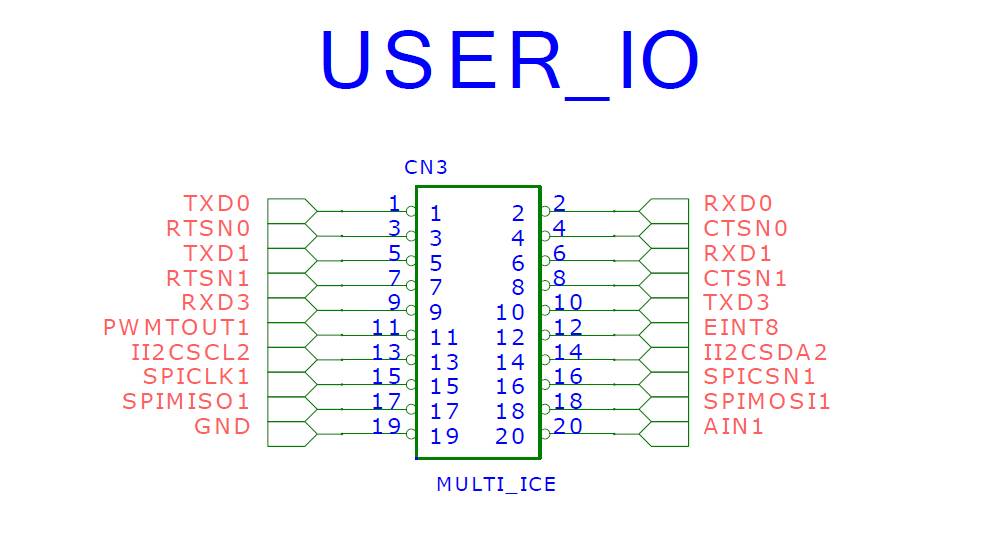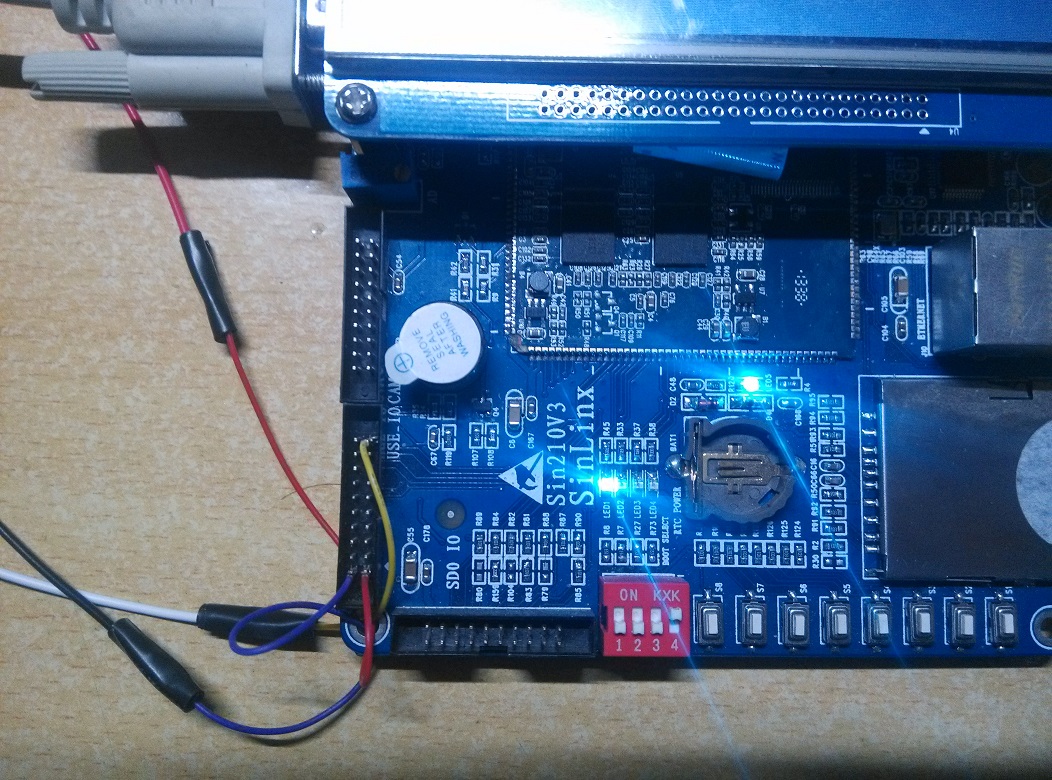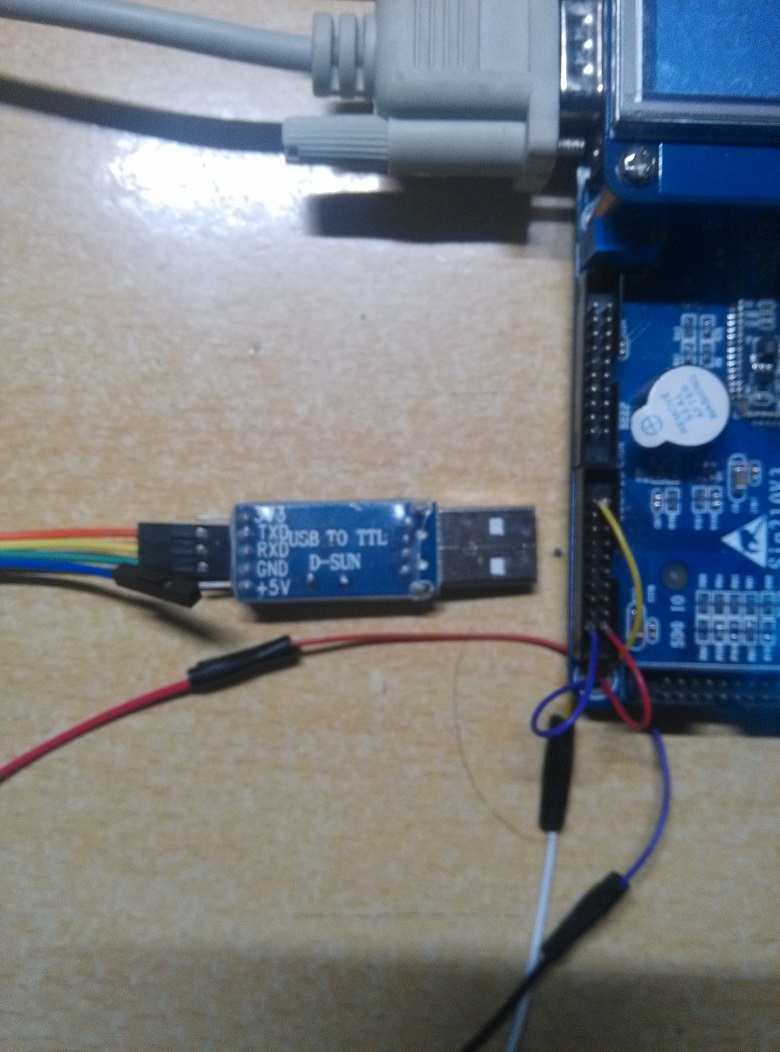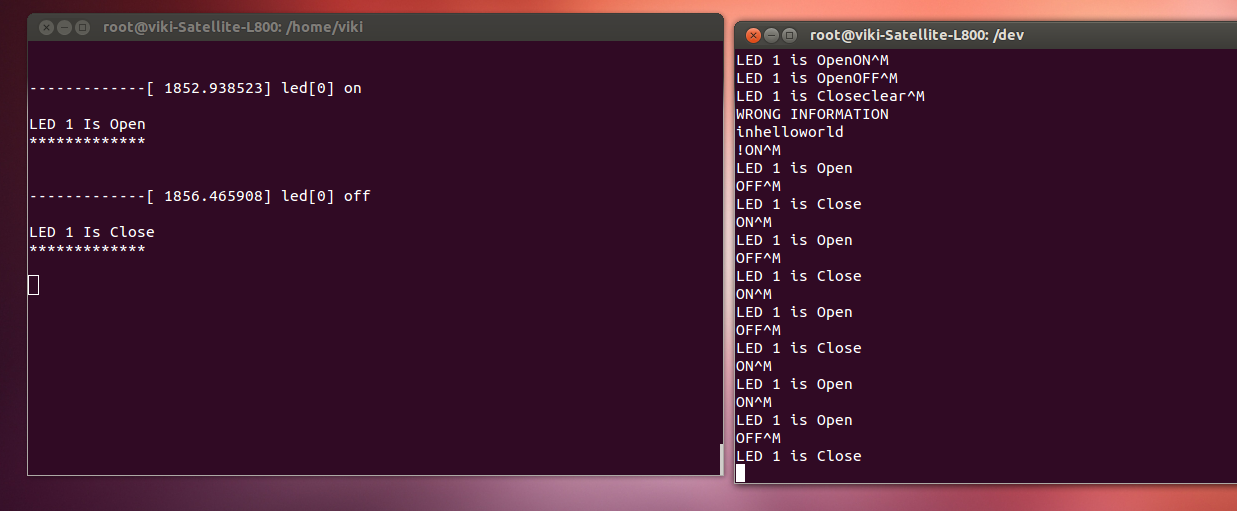通过串口控制LED1状态
串口输入 ON LED1 点亮
串口输入 OFF LED1 熄灭
串口输入 其它 报错
1、驱动
串口驱动程序官方已经给出
代码路径:/kernel_smdkv210/drivers/serial/samsung.c
2、硬件
SIN210用户IO 扩展口,有1 路SPI 总线,1 路IIC 总线,两个五线串口,一个三线串口,1 路AD 输入,1 个PWM ,1 个中断,5V 电源和GND 方便用户各种应用扩展。

图19-1: User IO 原理图
开发板上USER_IO 带白色三角形标记的就是对应的 上图的一号引脚。
开发板中的com口连接的是TXD2和RXD3 用于系统调试,所以UserIO中没有这两个引脚,如下所以:

图19-2: COM 2 电路
笔者采用的是通过TXD0和RXD0来控制LED,用到了一个USB转TTL的电平转换模块:
将USB装TTL的 TXD、RXD、GND和开发板的TXD0、RXD0、GND相连接,如此硬件编连接好了。

图19-3-0: 连接

图19-3-1: 连接
3、应用
下面就是要编写应用程序了,结合以前的文章LED,串口配置校验位什么的,就不解释怎么用了,单片机里都有学过的,废话不说了,直接贴代码:
/**** USART0_LED.c ****/
#include <stdio.h>
#include <stdlib.h>
#include <unistd.h>
#include <sys/types.h>
#include <sys/stat.h>
#include <fcntl.h>
#include <termios.h>
#include <errno.h>
#include <sys/time.h>
#define LED1 0
#define LED2 1
#define LED3 2
#define LED4 3
#define LED_ON 0
#define LED_OFF 1
#define TRUE 1
#define FALSE -1
int speed_arr[] = {B115200, B38400, B19200, B9600, B4800, B2400, B1200, B300,
B38400, B19200, B9600, B4800, B2400, B1200, B300, };
int name_arr[] = {115200, 38400, 19200, 9600, 4800, 2400, 1200, 300,
38400, 19200, 9600, 4800, 2400, 1200, 300, };
void set_speed(int fd, int speed)
{
int i;
int status;
struct termios Opt;
tcgetattr(fd, &Opt);
for ( i= 0; i < sizeof(speed_arr) / sizeof(int); i++)
{
if (speed == name_arr[i])
{
tcflush(fd, TCIOFLUSH);
cfsetispeed(&Opt, speed_arr[i]);
cfsetospeed(&Opt, speed_arr[i]);
status = tcsetattr(fd, TCSANOW, &Opt);
if (status != 0)
perror("tcsetattr fd1");
return;
}
tcflush(fd,TCIOFLUSH);
}
}
int set_Parity(int fd,int databits,int stopbits,int parity)
{
struct termios options;
if ( tcgetattr( fd,&options) != 0)
{
perror("SetupSerial 1");
return(FALSE);
}
options.c_cflag &= ~CSIZE;
switch (databits)
{
case 7:
options.c_cflag |= CS7;
break;
case 8:
options.c_cflag |= CS8;
break;
default:
fprintf(stderr,"Unsupported data size\n");
return (FALSE);
}
switch (parity)
{
case 'n':
case 'N':
options.c_cflag &= ~PARENB; /* Clear parity enable */
options.c_iflag &= ~INPCK; /* Enable parity checking */
options.c_iflag &= ~(ICRNL|IGNCR);
options.c_lflag &= ~(ICANON );
break;
case 'o':
case 'O':
options.c_cflag |= (PARODD | PARENB);
options.c_iflag |= INPCK; /* Disnable parity checking */
break;
case 'e':
case 'E':
options.c_cflag |= PARENB; /* Enable parity */
options.c_cflag &= ~PARODD;
options.c_iflag |= INPCK; /* Disnable parity checking */
break;
case 'S':
case 's': /*as no parity*/
options.c_cflag &= ~PARENB;
options.c_cflag &= ~CSTOPB;
break;
default:
fprintf(stderr,"Unsupported parity\n");
return (FALSE);
}
switch (stopbits)
{
case 1:
options.c_cflag &= ~CSTOPB;
break;
case 2:
options.c_cflag |= CSTOPB;
break;
default:
fprintf(stderr,"Unsupported stop bits\n");
return (FALSE);
}
/* Set input parity option */
if (parity != 'n')
options.c_iflag |= INPCK;
options.c_cc[VTIME] = 150; // 15 seconds
options.c_cc[VMIN] = 0;
tcflush(fd,TCIFLUSH); /* Update the options and do it NOW */
if (tcsetattr(fd,TCSANOW,&options) != 0)
{
perror("SetupSerial 3");
return (FALSE);
}
return (TRUE);
}
int OpenDev(char *Dev)
{
int fd = open( Dev, O_RDWR ); //| O_NOCTTY | O_NDELAY
if (-1 == fd)
{
perror("Can't Open Serial Port");
return -1;
}
else
return fd;
}
int main(int argc, char **argv)
{
int fd;
int nread;
char buffer[512];
char *dev ="/dev/ttySAC0";
int n=0,i=0;
int fdled = -1;
fdled = open("/dev/led",O_RDWR);
if(fdled<0)
{
printf("Error:Can't open /dev/leds\n");
return -1;
}
ioctl(fdled, LED_OFF, LED1);
ioctl(fdled, LED_OFF, LED2);
ioctl(fdled, LED_OFF, LED3);
ioctl(fdled, LED_OFF, LED4);
fd = OpenDev(dev);
if (fd>0)
set_speed(fd,115200);
else
{
printf("Can't Open Serial Port!\n");
exit(0);
}
if (set_Parity(fd,8,1,'N')== FALSE)
{
printf("Set Parity Error\n");
exit(1);
}
printf("\nWelcome to TTYtest\nHelloWii\n");
write(fd,"helloworld\n!!!!\n",12);
while(1)
{
nread = read(fd,&buffer[n],1);
n++;
if (buffer[n-1] == '\r')
{
printf("\n-------------\n");
if((buffer[0]=='O')&&(buffer[1]=='N'))
{
write(fd, "\nLED 1 is Open\n", 15);
printf("LED 1 Is Open");
ioctl(fdled, LED_ON, LED1);
}
else if((buffer[0]=='O')&&(buffer[1]=='F')&&(buffer[2]=='F'))
{
write(fd, "\nLED 1 is Close\n", 16);
printf("LED 1 Is Close");
ioctl(fdled, LED_OFF, LED1);
}
else
{
write(fd, "\nWRONG INFORMATION\n\n", 21);
printf("WRONG INFORMATION\n");
}
printf("\n*************\n\n");n=0;
}
}
}
# General Makefile Exec := USART0_LED Obj := USART0_LED.c CC := arm-linux-gcc $(Exec) : $(Obj) $(CC) -o $@ $(Obj) $(LDLIBS$(LDLIBS-$(@))) clean: rm -vf $(Exec) *.elf *.o
4、运行
编辑生成可执行文件,到开发板上,运行,我在Ubuntu系统中使用的minicom,配置好波特率即可
(注:下图左侧是 com2调试串口,有测试USART0控制串口)

图19-4: 串口效果

图19-5: 串口效果

 我要赚赏金
我要赚赏金

